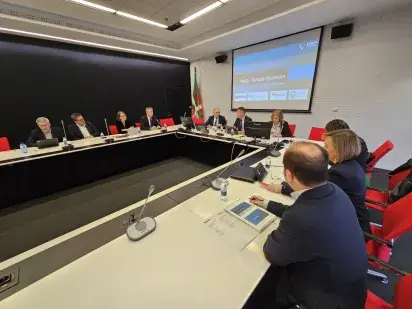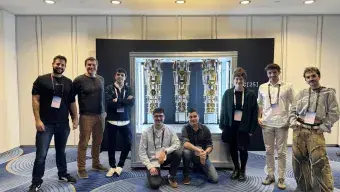Constitution of the Interinstitutional Committee for the Basque Quantum Strategy
February 14, 2024Integrated by the Basque Government and the three Provincial Councils of the Basque Country, the Committee has the task of coordinating the activities and support programs of the Basque Quantum Strategy.

This afternoon, the Minister of Education, Jokin Bildarratz, presided over the establishment meeting of the Interinstitutional Committee for the Basque Quantum Strategy (BasQ), held at the headquarters of the Basque Government in Vitoria-Gasteiz. Alongside the minister, attendees included the Commissioner for Science, Technology, and Innovation, Cristina Uriarte, and the Deputy Minister for Universities and Innovation, Adolfo Morais. Led by the Department of Education of the Basque Government, in collaboration with the provincial councils of Araba, Bizkaia, and Gipuzkoa, Basque Quantum is strategically significant for Euskadi in the field of quantum technologies. Its ultimate goal is to position Euskadi as a leading ecosystem for research, talent, and innovation in southern Europe.
The newly constituted committee, composed of representatives from the Basque Government across various departments and the three provincial councils, has the mission of coordinating the activities and support programs of the Basque Quantum Strategy. Collaboration and interinstitutional coordination are essential to address the new scenario and achieve the objectives set by BasQ. The committee will convene twice a year.
Representatives from the provincial institutions who participated in the meeting include Saray Zárate, Deputy for Economic Development and Innovation of Araba; Ainara Basurko, Deputy for Economic Promotion of Bizkaia; and Ane Insausti, Deputy for Economic Promotion and Strategic Projects of Gipuzkoa. On behalf of the Basque Government, representatives from the departments of Economic Development, Sustainability and Environment, Health, Public Governance and Self-Government, and Economy and Finance were present. Additionally, Javier Aizpurua, the scientific director of the BasQ Strategy, also participated.
Pluri-Institutional Strategy
During the opening session, Minister of Education Jokin Bildarratz outlined the key principles of the Basque Quantum Strategy. He emphasized the interinstitutional nature of this strategy, as BasQ is conceived as a national project driven by the Basque Government and the three provincial councils. “It is a pluri-institutional project aimed at advancing quantum technologies in Euskadi, grounded in the fundamental starting point of scientific excellence.”
Bildarratz highlighted the four areas that BasQ addresses within quantum science and technology: communications, sensing, quantum computing, and simulation. Notably, one of the significant projects within this comprehensive strategy is the BasQ-IBM collaboration. “It occupies a prominent space within the global BasQ strategy. Approximately one year from now, Euskadi will receive an advanced next-generation quantum computer from IBM, marking an unprecedented milestone for this strategy and for Euskadi,” he stated.
According to the counselor’s statement, the fundamental pillar on which BasQ is built is the long journey taken by excellence in science in the Basque Country over the last few decades. It relies on an advanced and well-positioned scientific ecosystem, including leading research centers, the Ikerbasque Foundation, and universities. These institutions have accumulated scientific knowledge and conducted research on an international scale for several decades. Recently, we have witnessed a progressive increase in activity in the field of quantum science and technologies. Numerous initiatives have been launched and will continue to be promoted by all the departments and institutions represented here today, emphasizing the interinstitutional nature of the strategy.
Therefore, the counselor advocates for cohesion among institutions. To become leaders in this field, we must compete beyond the Basque Country, making collaboration within the region both an opportunity and a necessity. Institutional cohesion will strengthen us in facing this challenge.
BasQ Pilot Group
The newly established committee will soon launch the BasQ Pilot Group, whose main objective is to coordinate and drive the implementation of the BasQ Strategy. This group will consist of representatives from the Basque Government departments where quantum technologies could have an impact, as well as representatives from the three provincial councils, research and university ecosystem agents, and the scientific director of BasQ. The Pilot Group guides actions and benefits from the technical work carried out by the strategy’s Working Groups.
Cristina Uriarte, Commissioner for Science, Technology, and Innovation, presented the governance model that the Interinstitutional Committee will follow. Under this Pilot Group, four BasQ working groups will be established based on different areas: Research, Talent (Education/Training), Impact (Innovation and Transfer), and Infrastructure. Each working group will include personnel from the involved administrations, as well as scientific, technological, and business agents. They will operate autonomously and meet as needed to ensure the strategy’s effectiveness and coordination, fostering awareness of the initiatives undertaken.
During the meeting, Vice-Counselor for Universities and Research Adolfo Morais also highlighted the Ikur Strategy for excellence in research, to which BasQ is anchored. Quantum technologies are precisely one of the areas where the Ikur Strategy promotes research, alongside Neurobiosciences, Neutronics, Supercomputing, and Artificial Intelligence.
Source: irekia.eus




